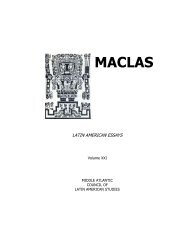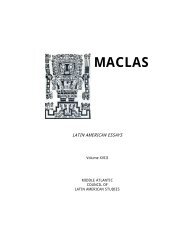latin american essays maclas
latin american essays maclas
latin american essays maclas
You also want an ePaper? Increase the reach of your titles
YUMPU automatically turns print PDFs into web optimized ePapers that Google loves.
explanations raising doubts about the emergence of a Western Hemispheric<br />
continental society and a corresponding American International Law, and legal<br />
arguments questioning the right of the American republics to develop their own<br />
regional legal system.<br />
In terms of historical explanations, Sá Vianna and his philosophical allies<br />
do not believe that the Western Hemisphere has developed a sense of<br />
continental solidarity that is sufficiently unique and cohesive to serve as the basis<br />
for a distinct regional legal system for two specific reasons:<br />
• First, it is difficult to argue that the countries of the Western Hemisphere<br />
have developed a truly new and unique regional American<br />
consciousness, historical tradition, and legal system when most of their<br />
customs and domestic legal systems are actually based on those of the<br />
European states (Sá Vianna 1912, 14-16, 67-74).<br />
• Second, if one were to accept that the differences between Europe and<br />
the Western Hemisphere are strong enough to justify the existence of<br />
two separate international legal systems, 13 then the differences within<br />
the Western Hemisphere would also give rise to the emergence of<br />
separate sub-regional legal systems. 14<br />
Sá Vianna and his intellectual associates not only question the existence of<br />
American International Law from a historical perspective, but also the right of<br />
the American republics to develop such a legal system. They take this position<br />
on the basis of the following legal arguments (Sá Vianna 1912, 8):<br />
• First, no region or group of states should be allowed to tamper<br />
unilaterally with international law. International law must be universal<br />
and should be based on the consent of all countries, or at least a<br />
substantial majority of them. Just as domestic law applies to all citizens,<br />
international law must also apply to all states (Sá Vianna 1912, 13). 15<br />
• Second, permitting the emergence of regional legal systems would<br />
threaten both the development and the strengthening of global<br />
international law. For Sá Vianna and Peruvian jurist and diplomat<br />
Alberto Ulloa y Sotomayor, the thesis of American International Law and<br />
the segregationist spirit that inspired it threaten both the continued<br />
development of the global legal system and the full integration of the<br />
American republics into the international community. The progress of<br />
international law has always been toward uniformity and universality (Sá<br />
Vianna 1912, 65-66, 77). More specifically, Ulloa y Sotomayor argues<br />
that American International Law does not exist because its alleged<br />
principles have been gradually integrated into global international law. 16<br />
• Third, in accordance with the Jus-naturalist School of Legal Philosophy’s<br />
premises that all law is derived from natural law and that all human beings<br />
37




